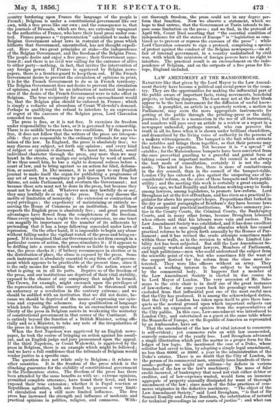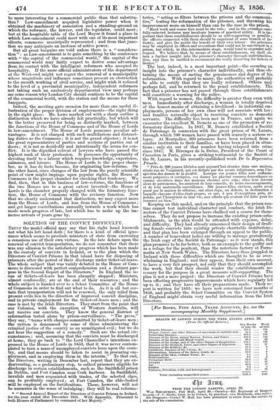LAW AMENDMENT AT THE MANSIONHOUSE.
BANQUETS like that given by the Lord Mayor to the Law Amend- ment Society have become a political and social power in the coun- try. They are the opportunities for making the influential part of the public aware of important facts, rising movements, beneficial projects, or lurking dangers. The feast may not at the first blush appear to be the best instrument for the diffusion of useful know- ledge. . A pamphlet, an article in a quarterly review, a motion in Par iament; may seem the more appropriate instruments for getting at the public through the printing-press or the daily journals ; but there is a mannerism in the use of all instruments, and numbers will pass over an article in a review or a report in a newspaper unheeded, perhaps unread, who can perceive the truth in all its force when it is shown under brilliant chandeliers, and dramatized by the living voice of authority in the persons of a mo)lern wittenagemote. The banquet is the bait which attracts the notables and brings them together, so that their persons may lend force to the exposition. Not because it is " a spread" of eatables ; for the Mansionhouse banquets have been converted from the once proverbial guzzling to a graceful and genial form of taking counsel on important matters. Set council is not always the best mode of consultation, certainly it is not the only mode. The mind. is less free, there is more of combativeness in the dry council, than in the council of the banquet-table. London City has entered a plea against the unsparing axe of in- considerate reform, on the score of these banquets and their public utility ; and the meeting this week is certainly a great example. Years ago, we had Romilly and Bentham working away in books among lawyers, among legislators, to promote law-reform. Lord Brougham sat at the feet ofBentham, and has risen as a practical le- gislator far above his preceptor's hopes. Propositions that lurked in the dry or quaint paragraphs of Bentham's day have become laws of the country and practical institutions. Wehave summary jus- tice in the County Courts, the Criminal Courts, the Bankruptcy Courts, and in many other forms, because Brougham laboured when others said that his labours were vain and useless. The Law Amendment Society was established, and it has done excellent work. It has at once supplied the stimulus which has caused practical reforms to be given forth annually by the Houses of Par- liament; and it has revised the crude attempts sometimes made within those walls, as in the revision to which. the Limited Lia- bility Act has been subjected. But still the Law Amendment So- ciety mainly worked amongst lawyers, Members of Parliament, and high politicians--men who could understand the subject from the scientific point of view' but who sometimes felt the want of the support derived for the reform from the class most in- terested. They were like officers without an army. They wanted a working interest in the subject to be expressed by the commercial body. It happens that a member of the Law Amendment Society is elected in due course to be Lord. Mayor of London. The very accession of Mr. Salo- mans to the civic chair is in itself one of the great instances of law-reform ; for some years back his genealogy would have excluded from that influential post one of the most useful men that the City has produced. It is among the acknowledged duties, that the City of London has taken upon itself to give these ban- quets as the neutral ground upon which important subjects can meet with an expression of opinion from the representatives of the City public. In this case, Law-amendment was introduced to London City, and entertained as a guest at the same table where the Monarchs of Europe, or the Republic of America as represented by an Ambassador, have sat. That the amendment of the law is of vital interest to commerce is self-evident; yet commerce rubs on with law unamended, scarcely conscious of the yearly loss. Lord Brougham advano a single illustration which put the matter in a proper form for the ledger of law logic. He mentioned the case of a Duke, whose solicitor had saved to him, by adopting a simple legal amendment, no less than 40001. or 5000/. a year in the administration of the Duke's estates. There is no doubt that the City of London, in the person of its commercial men' annually loses hundreds of thou- sands—perhaps perhaps we might say millions—by defects in various branches of the law or the law's machinery. The mass of false credit incurred, of bankruptcy that need not visit either debtor or creditor, and of law-expenses wasted, would form an immense aggregate of property annually dissipated for want of thorough amendment of the law ; since much of the false practices of com- merce originates in the defective machinery. "The object of the Law Amendment Society," said Lord Brougham, "is that of Sir Samuel Romilly and Jeremy Bentham, the substitution of natural for technical proceedings in our courts of justice " : and what can
be more interesting for a commercial public than that substitu- tion? Law-amendment acquired legislative power when it obtained the machinery of association and a standing-ground on which the reformer, the lawyer, and the legislator, could meet ; but at the hospitable table of the Lord Mayor it found a place in which Law-amendment could meet with one of its most important clients, commerce municipally represented ; and from that junc- tion we may anticipate an increase of active power. But all great bargains are void unless there is a " considera- tion " : as Law-amendment is to gain something by the conference with "the capital of the commercial world," the capital of the commercial world may fairly expect to derive some advantage from its contact with the intelligent reformers who accepted its hospitality. If the mere official administrators of the department at the West-end might not regret the removal of a municipality whose magnitude and influence sometimes present an obstruction to the smooth working of civil service, and might wish it reduced to the level of a provincial municipality, independent reformers not taking such an exclusively departmental view may perhaps see some reason why London City should continue to be the capital of the commercial world, with the station and the means for these banquets.
Indeed, the meeting gave occasion for more than one useful il- lustration of the proper division of employments—the right thing in the right place. Mr. Lowe marked out with a sharp outline a distinction which we have already felt practically, but which will be the better preserved for being so distinctly marked, between the functions of the House of Commons and of the House of Lords in law-amendment. The House of Lords possesses peculiar ad- vantages. It is not charged with such multifarious and distract- ing duties as the Commons ; it is not the grand objector ; it is not the great representative of parties and sections of parties out of doors ; it is not so decidedly and intentionally the arena for con- flict. It is the dignified retreat of lawyers who have passed the highest rank of their profession. It possesses the opportunity of devoting itself to a labour which requires knowledge, experience, calmness, and leisure. The House of Lords is the proper cham- ber, as it has de facto become, for originating law-reforms. On the other hand, since changes of the law from the purely scientific point of view might impinge upon popular rights, the House of Commons is the proper chamber for checking that tendency. We find, then, that in this business of law-reforms, the functions of the two Houses are to a great extent inverted—the House of Lords is the chamber properly charged with the formatory func- tion, the House of Commons with the revisory function. Now that we dearly understand that distinction, we may expect more from the House of Lords, and less from the House of Commons ; and get larger contributions annually, towards a work which has made much progress of late, but which has to make up the im- mense arrears of years gone by.







































 Previous page
Previous page